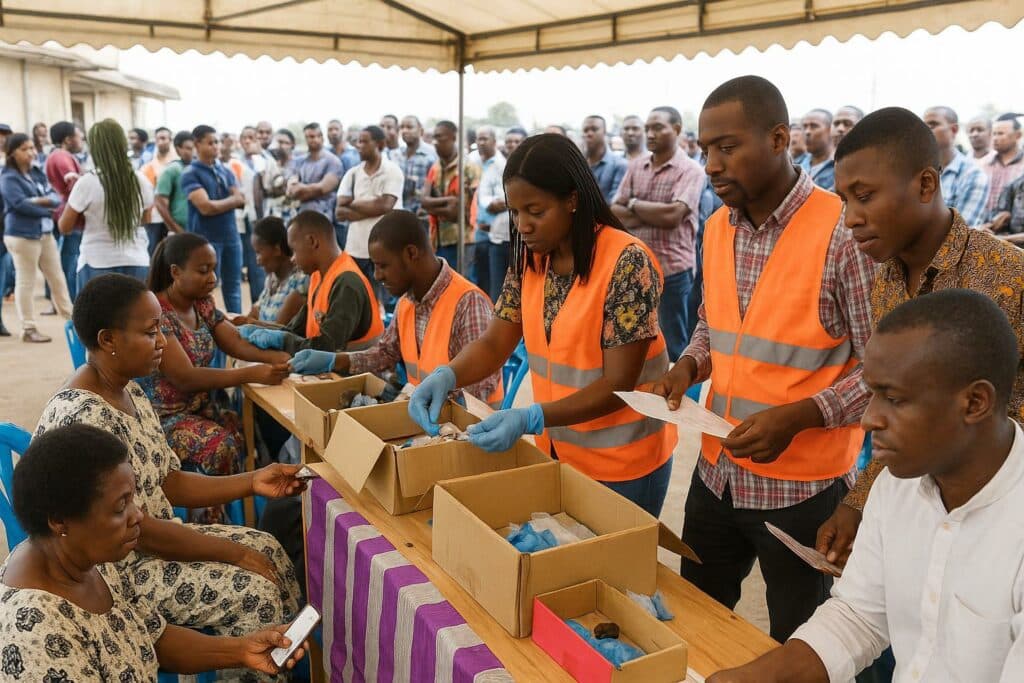A Civic Initiative Aligned with National Health Objectives
When the Association Saint François de Sales for Action and Solidarity, better known by its French acronym ASSAB, opens the doors of its mobile clinics on 27 August, the gesture will echo far beyond the immediate gift of vision. wp-signup.phped in France in 2005 and formally recognised in Congo-Brazzaville in 2017, ASSAB has built a reputation for discreet yet effective interventions in education and health. Its latest venture—a week-long campaign of free ophthalmic consultations and the distribution of prescription glasses—speaks to a broader alignment with the government’s ambition to bring essential primary health services closer to the population, as articulated in the National Development Plan 2022-2026.
The Silent Burden of Visual Impairment in Congo
According to the World Health Organization, up to 90 percent of global visual impairment is preventable or treatable, yet Sub-Saharan Africa still hosts a disproportionate share of avoidable blindness (WHO 2023). In Congo-Brazzaville, official data remain patchy, but a 2019 survey by the Central African Ophthalmic Council estimated that nearly one in six adults over forty lives with uncorrected refractive errors. The economic implications are significant: reduced productivity, early school drop-out and a higher dependency ratio. Against this backdrop, the symbolic value of handing a pair of glasses to an artisan, teacher or market vendor cannot be overstated. It is, in effect, a micro-intervention with macro-economic repercussions.
Public-Private Synergy and Diplomatic Echoes
ASSAB’s programme has received logistical facilitation from the Ministry of Health and Population, whose spokesperson praised the initiative as “a tangible expression of complementarity between civic engagement and public policy.” Such language reflects a diplomatic posture that has characterised Brazzaville’s approach to non-governmental partners under President Denis Sassou Nguesso, stressing collaboration rather than substitution. International actors have taken note. The French Embassy described the campaign as a model of South-North solidarity, while representatives of the African Development Bank observed that small-scale, targeted health actions often create the community trust necessary for larger systemic reforms.
Logistical Architecture of the Week-Long Campaign
From the Saint-François parish in Makélékélé to the popular quarters of Mfilou, mobile units equipped with autorefractors, tonometers and basic laboratory kits will rotate through five densely populated districts. ASSAB’s local representative, Dianny Okinda, explained that each beneficiary will undergo visual acuity testing, intra-ocular pressure measurement and, where necessary, the instillation of diagnostic eye drops before receiving customised lenses. Parallel stations will record blood pressure, glycaemia and body temperature. A modest consultation fee—pegged well below the standard private-clinic rate—aims to preserve dignity while ensuring crowd management. The association expects to reach at least three thousand residents, a figure considered realistic given the precedent of similar missions carried out in Pointe-Noire and Oyo in 2021.
Looking Ahead: Sustainable Eye-Care Solutions
Beyond the immediate impact, ASSAB’s leadership hopes to seed a culture of routine eye examination. Discussions are under way with the Congolese Society of Ophthalmology to establish a referral network so that complex cases identified during the campaign can access surgical care at the University Hospital of Brazzaville. Meanwhile, the Ministry of Health explores avenues to integrate school-based vision screening into the Essential Package of Health Services, echoing a 2022 recommendation of the International Agency for the Prevention of Blindness. As Dr Gilbert Mokoki, Minister of Health and Population, reminded observers at a recent press briefing, “Provision of spectacles may seem simple, yet it captures the essence of universal health coverage: timely, affordable and equitable care.” In that perspective, the forthcoming distribution drive is less a one-off charity than a calibrated contribution to national resilience.

